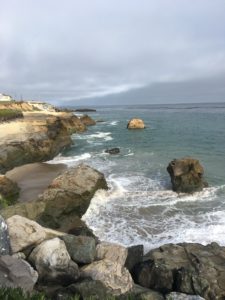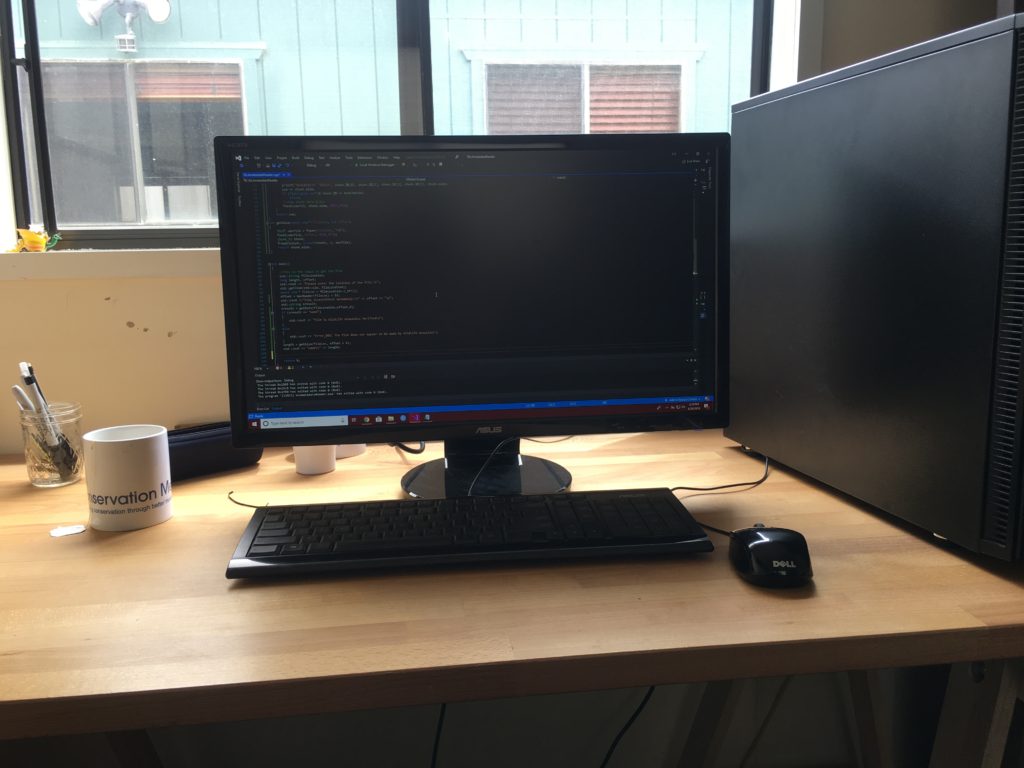Hello everybody! My name is Carter Andrew and this summer I have the honor of attending Conservation Metrics in Santa Cruz, California. Conservation Metrics is a marine conservation company centered around data analysis, machine learning, and wildlife acoustics. At Conservation Metrics, we use machine learning with intuitive pipelines to help make predictions on past, current, and future populations and ecosystem sustainability. We use an array of powerful tools to handle our heavy computing needs including Matlab and Microsoft Cloud Computing. We also handle clients from around the globe and analyze their data. For more information on Conservation Metrics please click here.
Monday:
On my first day, I woke up early, excited to meet my mentor and fellow employees. After a short but all too luxurious bike ride along the beach, I arrived at the UC Santa Cruz marine campus, located right next to the Natural Bridges Natural Park. I made my way to the Conservation Metrics headquarters. I was immediately greeted by Jeff Schlueter, one of the employees that I had been E-Mailing about my upcoming internship. I was introduced to my mentor Mattew McKown, along with the rest of the team. By 9:00 I had a conference with Matthew and Jeff on a first project for me to work on. Unfortunately, the programming language that is used at conservation metrics, R, is one I am not very familiar with. However, there was a project that the company had been unable to complete in R. One of the tools that conservation metrics uses are the survey microphones from the company Wild Life Acoustics. This company exports their audio files in a .wav format and adds extra metadata on to the end of the files. My task being: extract the metadata in a universal and efficient format. They believed that the only way to extract the data was by using the coding language c++ because of the language’s association with the WAK, BOM, and Unicode encoding formats. I was more familiar with the coding language c++ and so decided to take on the project while I worked on improving my fluency with R. I was immediately dubious of the success of the project due to the lack of formal documentation and internet pages on the internet. However, after a few preliminary searches, I found a series of built-in function the have proved to be continuously useful throughout the development of the project. These are fopen(), fseek(),fread, and fclose. They allow the reading of binary and its conversion through various data structures. This breakthrough was the only one I encountered today. But I was glad to make progress on my first day.
Tuesday:
I woke up at 6:30 to make myself breakfast and lunch for the day. The marine campus has no nearby restaurants or food vendors in quite an impressive radius. I left the house early so I could go watch some of the local surfers before work. I also spent some time with my host family, the Tersheys, chickens before heading down to the campus. After arrival, I spent most of my day working on advancing my project. One of the issues with the .wav file format type is the number of different types of data present in the project. I made some research into the workings of regular .wav files. They use a header made up of ASCII, 32-bit integers and hexadecimal numbers all hidden in the baffling Unicode format that can be seen in a text editor like windows notepad. Here is an example piece of code: %r?çÿlýWÚûÂ3ûLJûéþ®ûÙýÝûþ$üÿ. This day I discovered how to use fseek() to read parts of the program based off of an offset from the beginning, end or current position of the file. This was, like yesterday the only discovery I made. I felt that the progress was going slow and I was frustrated. Luckily I spent some time in the afternoon surfing and was able to get my mind off of the project. The water was frigid and I felt glad to have a warm wetsuit with me. The waves were very nice though and I surfed with the Tersheys children Russel and Navia until 8:00.
Wednesday:
By today I had started slipping into the routine of waking up and going to work. After watching the surf off Natural Bridges I biked to work. I discovered a way to decode the ASCII parts of the program which was very exciting to me because they are the important parts in decoding the extra part added by Wildlife Acoustics. However, the other part I was missing was decoding numbers correctly, which I suspected was going to be the more challenging of the two aspects. I also had yet to find a way to convert them into a malleable form. The only way to read the files was to convert them to LPBYTES, a long pointer to a matrix of bytes. There was still an issue with the memory allocation so that the file had lots of extra random characters added on to it. I had no way to get rid of these. This, again, to my despair was the only progress I made for the day. Today instead of surfing in the afternoon I skateboarded at one of the local parks, Mike Fox. The skateboard spot is well known for being the home skatepark of the pro skater Raven Tershey. Recognize the name? Good, you’ve been paying attention. Raven is the oldest of the Terhey kids and is living in the room directly below me, something I am extremely excited and honored about. I recalled tricks I have seen in video parts from the famous skater as I make my way around the park. Again, I stay out until around 8:00 and then go back to the house for dinner.
Thursday:
Thursday is the final day of the work-week for me. We work more hours each day but as a result, get a three-day weekend, something I think that I am going to enjoy very much. I also, ironically make a breakthrough today. I figure out how to convert LPBYTES into a regular string. Finally! Now I can read out important data from the files to verify their format and version. I have yet to find a way to convert the numbers into a readable format and cannot compete with the project. However, I have been doing superfluous research on the behavior of these numbers and the location at which important information can be found and have hope for next week. I wish everybody a good weekend and before I leave. Matthew pulls me aside and compliments me on my readiness to jump into a project and my consistent breakthroughs and improvements. I was happy and honored to receive the compliment and thanked him courteously.




There are no comments published yet.